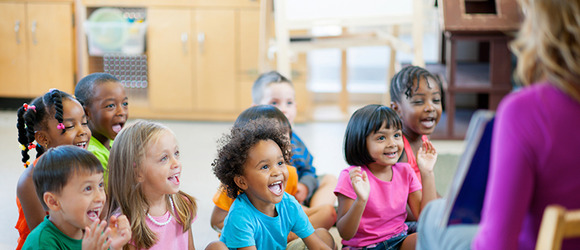Just How Day Treatment Can Improve Your Youngster's Growth and Social Abilities
Beyond the useful considerations of childcare, day care facilities offer a structured environment that can foster a kid's cognitive, social, and emotional growth. By exploring how day treatment can influence numerous facets of a youngster's advancement, we can get valuable insights right into the possible advantages that structured early childhood programs may supply.
Cognitive Growth Conveniences
Enhancing cognitive growth, day treatment programs use structured tasks and settings that promote kids's mental development and discovering capabilities. These programs play an important role in cultivating numerous cognitive abilities in kids. Through participating in age-appropriate tasks such as puzzles, narration, and academic games, youngsters can improve their problem-solving abilities, essential assuming skills, and memory retention.
Additionally, the social interactions within a daycare establishing provide chances for children to practice interaction, negotiation, and problem resolution, every one of which add to their cognitive growth. By taking part in team activities, kids find out to share, take turns, and work collaboratively, cultivating the advancement of necessary cognitive skills.
Additionally, the direct exposure to a diverse array of experiences and stimuli in a daycare atmosphere can considerably affect a kid's cognitive advancement. Youngsters are presented to new ideas, concepts, and point of views, which can widen their understanding of the world around them and promote their inquisitiveness and creativity. In general, daycare programs play a vital function in boosting cognitive growth in young children, setting a solid structure for future scholastic success.
Social Skills Enhancement
In addition to cultivating cognitive development, day care programs additionally play an essential function in supporting youngsters's social abilities. Social abilities are vital for a child's general advancement and success in numerous aspects of life. Day care offers a structured atmosphere where kids discover to connect with peers, educators, and various other grownups, aiding them create essential social abilities such as interaction, cooperation, empathy, and problem-solving.
Through group activities, play, and arranged video games, youngsters in daycare learn how to share, take turns, and work collaboratively with others. These experiences assist children build friendships, learn to resolve conflicts peacefully, and create a feeling of compassion towards others' sensations and viewpoints. Being in a diverse setting subjects kids to different histories, cultures, and personalities, cultivating resistance and acceptance.
Daycare settings likewise use opportunities for children to practice social etiquette, manners, and communication abilities, preparing them for future social communications in school and past. Generally, the social skills gotten in daycare can have a lasting influence on a kid's capacity to develop relationships, browse social scenarios, and prosper in various social setups.
Emotional Knowledge Growth
The growing of emotional knowledge in youngsters with engagement in daycare programs is an essential component of their alternative development. Daycare setups offer youngsters with opportunities to connect with peers, caregivers, and instructors, fostering the advancement of psychological awareness, empathy, and social abilities. Via everyday interactions and structured tasks, youngsters find out to identify and manage their feelings, recognize the sensations of others, and communicate properly.

Behavioral Enhancement
Through constant participation in daycare programs, children commonly experience noteworthy behavior enhancements that favorably impact their general advancement. Daycare settings give regular rules and organized regimens, which help kids find out vital behavior skills such as complying with guidelines, sharing, and appreciating others. The interactions with peers and caretakers in a daycare setting also add to the growth of essential social abilities, consisting of communication, dispute resolution, and compassion.

Study has revealed that youngsters that attend day care typically show fewer behavioral issues and show much better self-regulation contrasted to those that do not. In general, the structured and caring environment of daycare programs supports children in establishing vital behavior skills that are advantageous for their future social communications and general well-being.

Prep for Academic Success
Kids that gain from enhanced actions in daycare settings are additionally well-prepped for academic success through the organized understanding atmospheres and encouraging communications supplied. Day care centers use a range of activities that promote cognitive growth, such as narration, puzzles, and arts and crafts, every one of which aid children enhance their analytical abilities and creativity. These tasks additionally present children to basic academic ideas in an enjoyable and interesting means, laying a strong structure for future learning.
Furthermore, the social interactions that kids experience in day treatment setups aid them develop essential skills for academic success, such as conflict, communication, and teamwork resolution. By communicating browse this site with their peers and caregivers, children find out just how to share their ideas and concepts successfully, team up on jobs, and navigate social circumstances, all of which are important for success in a discover this classroom setup.
Verdict
In verdict, daycare can considerably benefit a child's growth by enhancing cognitive abilities, improving social interactions, cultivating psychological intelligence, shaping actions, and preparing them for scholastic success. It offers a structured setting that motivates growth and understanding in numerous elements of a kid's life. Day care is a valuable source for moms and dads seeking to sustain their kid's overall growth and future success.
Beyond the practical factors to consider of childcare, day treatment centers offer a structured setting that can promote a child's cognitive, social, and psychological growth.In enhancement to fostering cognitive growth, day care programs also play an essential duty in nurturing youngsters's social skills. Day treatment offers an organized atmosphere where youngsters learn to connect with peers, instructors, and various other adults, aiding them develop necessary social skills such as interaction, cooperation, compassion, and problem-solving.
Day treatment setups offer youngsters with opportunities to connect with educators, peers, and caregivers, fostering the growth of emotional understanding, compassion, and social skills.In final thought, day treatment can greatly benefit a kid's growth by boosting cognitive skills, enhancing social communications, cultivating emotional intelligence, shaping actions, and preparing them for academic success.